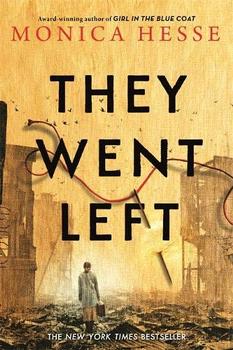Summary | Excerpt | Reading Guide | Reviews | Beyond the Book | Readalikes | Genres & Themes | Author Bio

Critics' Opinion:
Readers' Opinion:
First Published:
Apr 2020, 384 pages
Paperback:
Apr 2021, 384 pages
 Book Reviewed by:
Book Reviewed by:
Debbie Morrison
Buy This Book
Lower Silesia, August 1945
LINES. I AM GOOD AT LINES. I AM GOOD AT LINES BECAUSE YOU don't have to think in them, just stand in them, and this line is easy because now only a few people are in front of me, and easy because I understand the reason I am in it, and it's a good reason, and I am good at lines.
At the front of it, an official-looking woman—from the Red Cross, I think—sits behind a table. It's a nice, indoor table, as though it was carried out to the street from someone's dining room. Except, instead of sitting on a rug, it sits on cobblestones, and instead of candlesticks, it's piled with neat stacks of papers and smells of furniture polish, or I imagine it would; it looks like that kind of table. A solitary cup also sits on it, next to the papers at the proper two o'clock of an imaginary place setting like a leftover from the table's former life. A cup of tea for the official worker.
"Next," she says, and we move forward because this is how lines work; they move forward.
I look back toward the door, but the other nothing-girls don't come out to say goodbye. I'm the first one of us to leave the hospital. In the early weeks after the war, there were always goodbyes from the healthier patients, always plans being made. You could look out the ward window almost any time and see a truck grinding past, stuffed with German soldiers on their way home, Polish soldiers on their way home. Russians, a few Canadians, everyone traveling in a different direction, and every direction was someone's home, as if the world were a board game and all the pieces had ended up scattered in the wrong corners of the box.
But none of the nothing-girls were well enough then. So we don't have a protocol yet for what to do when one of us leaves. We have no addresses to exchange. We have nothing. We weigh nothing, we feel nothing, we existed on nothing, for years.
Our minds are nothing. That's the biggest nothing, the reason we are still in the hospital. Our minds are soft. Confused.
"Zofia? I didn't know if you wanted to keep this."
I turn to the voice, the little blond nurse jogging out the door, mouth like a red bow. She hands me a letter, addressed in my own handwriting. Return to sender. The sender was me; the addressee was—I'm not even sure who the addressee was this time. For months, from the day I was well enough to pick up a pen, I have been writing letters to everyone whose address I'd ever known. Have you seen him? Tell him to wait for me. But their addresses weren't their addresses anymore, and the mail wasn't the mail anymore. And I wasn't me anymore, but it became clear I couldn't do what I needed to from a hospital bed. If I wanted to find him, I would have to pull myself out of it.
Even though my mind is still soft, that's why I'm standing outside and the other girls are still in the window.
Tell him the doctors won't let me leave by myself until I'm better, I wrote. Tell him I won't be better until I leave and find him.
"Here, I also made this for you," the blond nurse says, passing me a bundle of cloth, still warm. Food. The heat feels nice against my stomach. I start to unwrap the cloth so I can hand it back, but she says to keep it.
So now I own this checkered cloth. It is mine, and that will bring the number of possessions I own in this world to six. Later, I can fold it and use it as a kerchief for my hair, or I can cut it in half, in triangles, and have two handkerchiefs; that would bring my number of possessions to seven. I also have a dress, undergarments, a pair of shoes, a donated bill of money in a large denomination, and a document saying I was a prisoner in Gross-Rosen. It's supposed to connect me with relief organizations, help with food rations. The workers who gave it to me said it would be my most valuable possession. "
Excerpted from They Went Left by Monica Hesse. Copyright © 2020 by Monica Hesse. Excerpted by permission of Little, Brown Books for Young Readers. All rights reserved. No part of this excerpt may be reproduced or reprinted without permission in writing from the publisher.





The House on Biscayne Bay
by Chanel Cleeton
As death stalks a gothic mansion in Miami, the lives of two women intertwine as the past and present collide.

The Flower Sisters
by Michelle Collins Anderson
From the new Fannie Flagg of the Ozarks, a richly-woven story of family, forgiveness, and reinvention.

The Funeral Cryer by Wenyan Lu
Debut novelist Wenyan Lu brings us this witty yet profound story about one woman's midlife reawakening in contemporary rural China.
Your guide toexceptional books
BookBrowse seeks out and recommends the best in contemporary fiction and nonfiction—books that not only engage and entertain but also deepen our understanding of ourselves and the world around us.